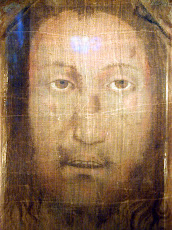The Italian poet Dante Alighieri (1265-1321) wrote lines arguably described as among the greatest lines of poetry ever as the climax of his Divine Comedy inspired by his own gazing upon the image of the Veronica at St. Peter's Basilica on Easter Wednesday, in the Holy Year of 1300. He begins by quoting the admonition he received from the contemplative monk, St. Bernard of Clairvaux.
"Look now on the face that most resembles Christ, for only its brightness can fit thee to see Christ"
"Riguarda omai nella faccia che a Cristo piu' si somiglia, che la sua chiarezza sola ti puo' disporre a veder Cristo" Paradise Canto XXXII, 85-87
In Canto XXXIII after having heeded the words of the saint, gazing upward the poet exclaims:
"Not that the living light at which I gazed had more than a single aspect -- for it was ever the same as it was before-- but by my sight gaining strength as I looked, the one sole appearance, I myself transformed, was, for me, transformed."
"Non perche piu' ch' un semplice sembiante fosse nel vive lume ch' io mirava, che tal e' sempre qual s'era davante; ma per la vista che s'avvalorava in me guardando, una sola parvenza, mutandom' io, a me si travagliava."Canto XXXIII, 109- 114
"O Light Eternal, that alone abidest in Thyself, alone knowest Thyself, and, known to Thyself and knowing, lovest and smilest on Thyself!. That circling which, thus begotten, appeared in Thee as reflected light, when my eyes dwelt on it for a time, seemed to me, within it and in its own colour, painted with our likeness, for which my sight was wholly given to it."
"O luce eterna che sola in te sidi, sola t'intendi, e da te intelletta e intendente te ami e arridi!, Quella ciculazion che si concetta pareva in te come lume reflesso dalli occhi miei alquanto circumspetta, dentro da se' del suo colore stesso, mi parve pinta della nostra effige; per che 'l mio viso in lei tutto era messo." Paradise, Canto XXXIII, 125-132
"Like the geometer who sets all his mind to the measuring of the circle and for all his thinking does not discover the principle he needs, such was I at that new vista. I wished to see how the image was fitted to the circle and how it has its place there; but my own wings were not sufficient for that had not my mind been struck by a flash of light wherein my desire came to pass; Here power failed the high fantasy; but now my desire and will, like a wheel that spins with even motion, were revolved by the Love that moves the sun and the other stars."
Qual e' 'l geometra che tutto s'affige per misurar lo cerchio, e non ritrova, pensando, quel principio ond'elli indige, tal era io a quella vista nova: veder volea come si convenne l'imago al cerchio e come vi s'indova; ma non eran da cio' le proprie penne: se non che la mia menta fu percossa da un folgore in che sua voglia venne. All'alta fantasia qui manco' possa; ma gia' volgeva il mio disio e ' velle, si come rota ch'igualmente e' mossa, l'amor che move il sole e l'altre stelle." Paradise Canto XXXIII, 133-145











No comments:
Post a Comment